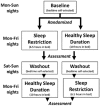Sweet/dessert foods are more appealing to adolescents after sleep restriction
- PMID: 25706861
- PMCID: PMC4338308
- DOI: 10.1371/journal.pone.0115434
Sweet/dessert foods are more appealing to adolescents after sleep restriction
Abstract
Study objective: Examine the effect of experimental sleep restriction (SR) on adolescents' subjective hunger and perceived appeal of sweet/dessert foods versus other foods. A secondary goal was to replicate previous findings on the effects of SR on dietary intake.
Design: Randomized cross-over sleep restriction-extension paradigm.
Setting: Sleep was obtained and monitored at home. Outcome measures were gathered during office visits.
Participants: 31 typically-developing adolescents aged 14-17 years.
Interventions: The three-week protocol consisted of a baseline week, followed randomly by five consecutive nights of SR (6.5 hours in bed) versus healthy sleep duration (HS; 10 hours in bed), a 2-night wash-out period, and a 5-night cross-over.
Measurements: Sleep was monitored via actigraphy. The morning after each experimental condition, teens rated their hunger, underwent a 24-hour diet recall interview, and rated the appeal of a series of pictures of sweet/dessert foods (e.g., ice cream, candy) and non-sweets (meat, eggs, fruits, vegetables).
Results: Teens rated pictures of sweet/dessert foods to be more appealing after SR than after HS (Cohen's d = .41, t = 2.07, p = .045). The sleep manipulation did not affect self-reported hunger or the appeal of non-sweet foods (p >.10). Consistent with our prior work, intake of overall calories was 11% higher and consumption of sweet/dessert servings was 52% greater during SR than HS.
Conclusions: Adolescent SR appears to increase the subjective appeal of sweet/dessert foods, indicating a potential mechanism by which SR might contribute to weight gain and the risk for obesity and chronic illness.
Conflict of interest statement
Figures


Similar articles
-
Dietary intake following experimentally restricted sleep in adolescents.Sleep. 2013 Jun 1;36(6):827-34. doi: 10.5665/sleep.2704. Sleep. 2013. PMID: 23729925 Free PMC article. Clinical Trial.
-
Sleep restriction worsens mood and emotion regulation in adolescents.J Child Psychol Psychiatry. 2014;55(2):180-90. doi: 10.1111/jcpp.12125. Epub 2013 Jul 30. J Child Psychol Psychiatry. 2014. PMID: 24889207 Free PMC article. Clinical Trial.
-
Hot, Tired and Hungry: The Snacking Behaviour and Food Cravings of Firefighters During Multi-Day Simulated Wildfire Suppression.Nutrients. 2020 Apr 21;12(4):1160. doi: 10.3390/nu12041160. Nutrients. 2020. PMID: 32326354 Free PMC article.
-
Isolated and Combined Effects of Moderate Normobaric Hypoxia and Sleep Restriction on Energy Intake and Food Reward.Int J Sport Nutr Exerc Metab. 2024 Nov 11;35(1):51-60. doi: 10.1123/ijsnem.2024-0146. Print 2025 Jan 1. Int J Sport Nutr Exerc Metab. 2024. PMID: 39527952
-
The effects of sleep disruption on metabolism, hunger, and satiety, and the influence of psychosocial stress and exercise: A narrative review.Diabetes Metab Res Rev. 2024 Feb;40(2):e3667. doi: 10.1002/dmrr.3667. Epub 2023 Jun 2. Diabetes Metab Res Rev. 2024. PMID: 37269143 Review.
Cited by
-
Weekend night vs. school night sleep patterns, weight status, and weight-related behaviors among adolescents.Sleep Health. 2021 Oct;7(5):572-580. doi: 10.1016/j.sleh.2021.07.008. Epub 2021 Sep 1. Sleep Health. 2021. PMID: 34479827 Free PMC article.
-
The Effect of Sleep Curtailment on Hedonic Responses to Liquid and Solid Food.Foods. 2019 Oct 10;8(10):465. doi: 10.3390/foods8100465. Foods. 2019. PMID: 31658647 Free PMC article.
-
Sleep timing is associated with self-reported dietary patterns in 9- to 15-year-olds.Sleep Health. 2017 Aug;3(4):269-275. doi: 10.1016/j.sleh.2017.05.005. Epub 2017 Jun 7. Sleep Health. 2017. PMID: 28709514 Free PMC article.
-
Associations of sleep duration and quality with disinhibited eating behaviors in adolescent girls at-risk for type 2 diabetes.Eat Behav. 2016 Aug;22:149-155. doi: 10.1016/j.eatbeh.2016.06.019. Epub 2016 Jun 2. Eat Behav. 2016. PMID: 27289521 Free PMC article.
-
The Association between Self-reported Sleep Duration and Body Mass Index among Korean Adolescents.J Korean Med Sci. 2016 Dec;31(12):1996-2001. doi: 10.3346/jkms.2016.31.12.1996. J Korean Med Sci. 2016. PMID: 27822941 Free PMC article.
References
Publication types
MeSH terms
Grants and funding
LinkOut - more resources
Full Text Sources
Other Literature Sources
Medical
Research Materials

